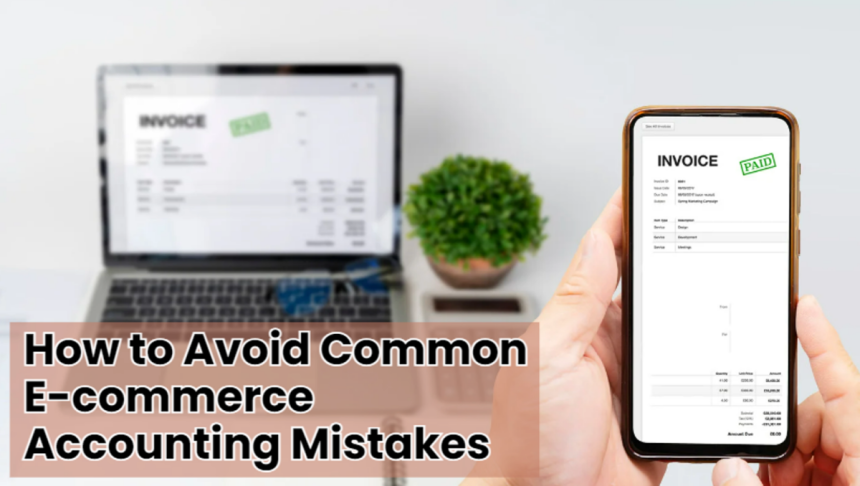Are you struggling to keep your e-commerce finances straight? Are you worried about making accounting mistakes that could harm your business? Navigating the complexities of e-commerce accounting can be challenging, especially due to the unique challenges of online transactions.
How can you ensure accuracy in your financial records while managing sales tax compliance, inventory, and cash flow? This article highlights common accounting mistakes e-commerce businesses make and provides practical, empathetic advice on avoiding these pitfalls.
Neglecting to Reconcile Accounts Regularly
One of the biggest mistakes in e-commerce accounting is not reconciling accounts. Reconciliation involves comparing financial records with bank statements and other financial documents for accuracy. If reconciliations are not done regularly, discrepancies might go unnoticed, leading to financial inaccuracies.
How to Avoid It
Establish a regular reconciliation schedule, such as weekly or monthly. Use accounting software that integrates with your e-commerce platform to automate the reconciliation process. Promptly review all transactions and identify any discrepancies.
Misclassifying Expenses and Revenues

Misclassifying expenses and revenues will distort your key financial statements and can lead to poor business decisions. For example, misclassifying a cost of goods sold expense as an operating expense will affect your gross profit calculations.
How to Avoid It
Develop a detailed chart of accounts specifically tailored to your e-commerce business. Ensure your accounting team is trained to classify transactions accurately. Some choose to have an accountant for ecommerce business to directly provide the expertise needed. Meanwhile, some use accounting software that provides category suggestions based on transaction types.
Ignoring Sales Tax Compliance
One major issue many online businesses face is sales tax compliance, especially if operating across multiple states or countries. Sales tax rates and rules vary by jurisdiction, and failure to comply can expose your business to severe penalties.
How to Avoid It
Research all the sales tax requirements for each region in which you conduct business. Utilize sales tax automation software to accurately compute and collect the correct amounts. Stay updated on new sales tax laws to adjust your processes accordingly.
Overlooking Inventory Management

Inventory management is integral for e-commerce businesses, but it is often overlooked in accounting practices. Consequently, inventory records become inaccurate, leading to stockouts, overstocking, and incorrect financial statements.
How to Avoid It
Implement an inventory management system that integrates with your e-commerce platform. Conduct regular physical inventory counts to verify your records. Ensure you track all costs associated with inventory, including purchase costs, shipping, and handling fees.
Failing to Track Shipping Costs
Shipping costs can have a significant impact on your profit margins. Many e-commerce businesses do not track these costs accurately, resulting in underestimated expenses and skewed financial reports.
How to Avoid It
Include shipping costs as a line item in your financial records. Consider using accounting software that automatically labels and tracks your shipping-related expenses. Regularly review your shipping costs to identify trends and potential savings.
Inadequate Record Keeping

Poor record keeping leads to many accounting mistakes and makes it difficult to produce accurate financial statements without proper bookkeeping solutions. Inadequate documentation of transactions, receipts, and invoices can result in lost deductions and compliance issues.
How to Avoid It
Establish an effective filing system for all financial documents using a startup accounting service. Computerize the records to have a handy duplicate and to back them up as well. Organize receipts, invoices, and other important documents in their respective folders.
Not Separating Personal and Business Finances
One common mistake small business entrepreneurs make is mixing personal and business finances. This complicates your accounting and makes it harder to track your business performance. It might also create some problems connected with taxes.
How to Avoid It
Open another bank account and credit card for your business. Keep personal and business expenses separate, and never use business funds for personal expenses. Manage business finances separately from personal finances using accounting software.
Failing to Plan for Seasonal Variations
Many e-commerce businesses experience seasonal sales fluctuations. This will most probably affect cash flow and inventory management if not duly considered. Not providing for these fluctuations in some way might mean financial stress during lean months, and having missed the opportunity in peak seasons for seasoned cfos.
How to Avoid It
Analyze historical sales data to pinpoint seasonal trends. Create a cash flow forecast that accounts for seasonal variations. Plan inventory purchases and marketing strategies around peak sales periods to maximize efficiency.
Underestimating the Importance of Cash Flow Management

Cash flow is the lifeblood of any business. One of the common pitfalls of e-commerce businesses is poor cash flow management. Focusing only on profits and disregarding cash flows in isolation can cause the emergence of liquidity issues and be a provoking factor for growth.
How to Avoid It
Monitor cash flow regularly with proper cash flow statements and, accordingly, speed up receivables, manage payables, and have a cash cushion in case of any unexpected expenses or slow months.
Not Seeking Professional Help
Most e-commerce accountants startups try to tackle every accounting job themselves, which is where everything goes wrong. Professional accountants will be able to devote their skills efficiently towards the management of complex financial tasks and ensure that everything complies with the regulations.
How to Avoid It
Employ an experienced accountant or bookkeeper who has e-commerce experience, or outsource the accounting function to a professional accounting firm. There are many different types of accounting software available that allow collaboration with your accountant.
Effective Cash Flow Management Strategies for E-commerce Businesses
| Strategy | Description | Benefits |
| Monitor Cash Flow Regularly | Regularly review cash flow statements and forecasts to understand your financial position. | Helps identify potential issues early and make informed decisions. |
| Accelerate Receivables | Implement strategies such as offering discounts for early payments or using invoice factoring. | Improves liquidity by speeding up the collection of cash. |
| Manage Payables Effectively | Negotiate longer payment terms with suppliers and prioritize paying high-interest debts first. | Enhances cash flow by delaying outflows and reducing interest expenses. |
| Maintain a Cash Reserve | Set aside a portion of profits as a reserve for unexpected expenses or slow periods. | Provides a financial cushion for emergencies and business continuity. |
| Control Inventory Levels | Use inventory management systems to avoid overstocking and stockouts, and align purchases with demand forecasts. | Optimizes cash usage by reducing excess inventory costs. |
Conclusion
It goes on to prove that avoiding common e-commerce accounting mistakes will help the business from maintaining error-free financial records and compliance to making informed decisions for the business.
Be confident in handling the intricacies involved in e-commerce accounting with the aid of best practices in place concerning regular reconciliation, proper classification of expenses, compliance with sales tax, and efficient management of cash flow.
Besides, technology and expert help can be harnessed to bring more efficiency into accounting processes for the long-term success of an e-commerce firm.
FAQs
1. Why is regular account reconciliation important for e-commerce businesses?
Regular reconciliation helps ensure accuracy in financial records by comparing your financial data with bank statements, and identifying discrepancies promptly.
2. How can I avoid misclassifying expenses and revenues in my e-commerce business?
Create a detailed chart of accounts, train your accounting team, and use accounting software that suggests categories based on transaction types.
3. What steps should I take to comply with sales tax regulations?
Research sales tax requirements for each region you operate in, use sales tax automation software and stay updated on changes in sales tax laws.
Lynn Martelli is an editor at Readability. She received her MFA in Creative Writing from Antioch University and has worked as an editor for over 10 years. Lynn has edited a wide variety of books, including fiction, non-fiction, memoirs, and more. In her free time, Lynn enjoys reading, writing, and spending time with her family and friends.















